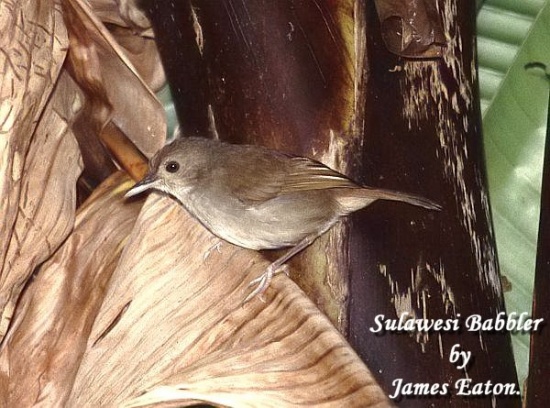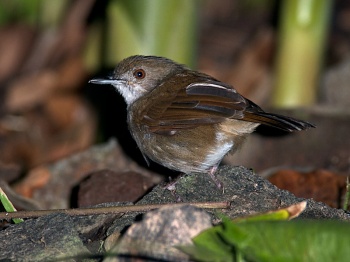m |
Sbarnhardt (talk | contribs) (Update Clements to Aug21, Removed double entry of Clements in references section) |
||
| Line 28: | Line 28: | ||
Resident species. | Resident species. | ||
==References== | ==References== | ||
| − | #{{Ref- | + | #{{Ref-Clements6thAug21}} |
{{Ref}} | {{Ref}} | ||
==External Links== | ==External Links== | ||
{{GSearch|Trichastoma+celebense}} | {{GSearch|Trichastoma+celebense}} | ||
[[Category:Birds]] [[Category:Trichastoma]] | [[Category:Birds]] [[Category:Trichastoma]] | ||
Revision as of 14:02, 26 October 2022
Alternative names: Celebes Babbler; Strickland's Babbler
- Trichastoma celebense
Identification
15.5 cm. A small, relatively featureless babbler:
- Strong grey bill
- Thin malar whisker
- Clinally varied in coloration (from rufous upperparts and whitish underparts to grey-brownish upperparts and rufous underparts)
Similar to White-chested Babbler and Ferruginous Babbler but ranges don't overlap.
Distribution
Endemic to Sulawesi, Indonesia.
Common and widespread within range.
Taxonomy
Four subspecies recognized:
- T. c. celebense in north Sulawesi
- T. c. togianense on Togian Island, north Sulawesi
- T. c. rufofuscum in central and southeast Sulawesi (including Butung Island)
- T. c. finschi in southwest Sulawesi
The proposed subspecies connectens and improbatum are usually merged with rufofuscum.
Clements now places this species in the genus Pellorneum.
Habitat
Wide variety of habitats from primary broadleaf forest to cultivated areas with settlements but density higher in forested areas. Found from the lowlands up to 1900m.
Behaviour
Feeds presumably on invertebrates.
A shy bird, usually foraging close to the ground, running like a mouse.
Breeding season from April to December. The nest is a cup made of dead leaves and grass blades. It's placed 0.3 to 0.5m above the ground. Lays 2 eggs.
Resident species.
References
- Clements, J. F., T. S. Schulenberg, M. J. Iliff, S. M. Billerman, T. A. Fredericks, J. A. Gerbracht, D. Lepage, B. L. Sullivan, and C. L. Wood. 2021. The eBird/Clements checklist of Birds of the World: v2021. Downloaded from https://www.birds.cornell.edu/clementschecklist/download/
Recommended Citation
- BirdForum Opus contributors. (2024) Sulawesi Babbler. In: BirdForum, the forum for wild birds and birding. Retrieved 5 June 2024 from https://www.birdforum.net/opus/Sulawesi_Babbler





